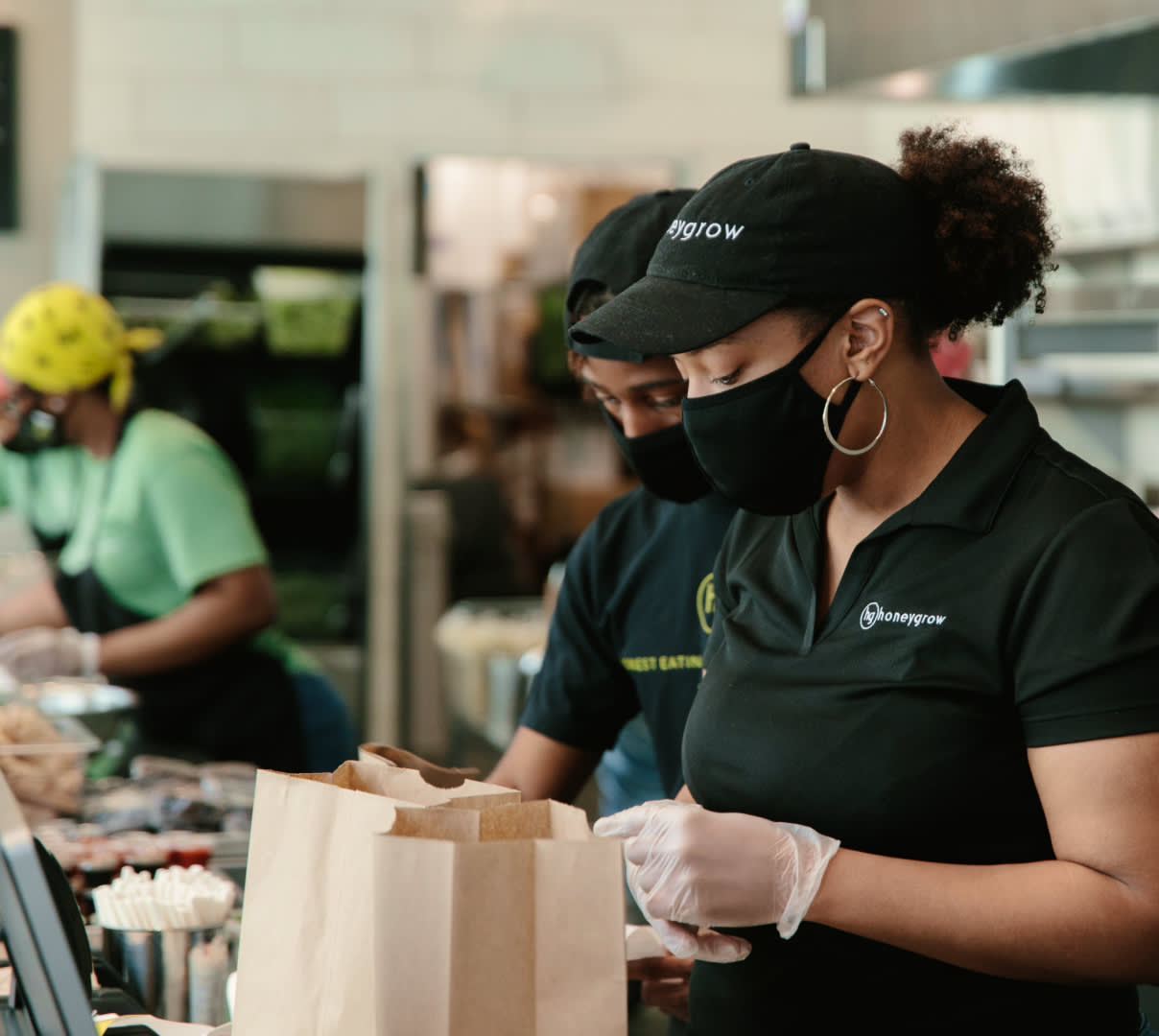Today's consumers, particularly Millennials and Gen Z, prioritize combating climate change when making purchasing decisions. In fact, 78% of customers are willing to pay more for their meals in a green restaurant.
Incorporating sustainable practices into your restaurant operations not only benefits the planet, but can help you build a following of loyal customers who are fans of both your food and your sustainability practices.
At the 2021 Main Street Strong Restaurant Conference, sustainability-focused restaurants honeygrow and HipCityVeg shared how they launched mission-driven businesses, attracted non-vegan customers, and supported their employees and communities during the pandemic.
Origin stories: Launching a sustainable restaurant
HipCityVeg
HipCityVeg Founder and CEO Nicole Marquis decided to try a plant-based diet after reading about its health and environmental impact in books like The China Study. "One of the most important things we can do to head off a climate crisis is eat more plants," she explained. "Eating just one plant-based meal a day can help."
In 2012, Nicole opened HipCityVeg, a fast-casual plant-based restaurant, in Philadelphia — and was pleasantly surprised by the enthusiastic response. "We were really blown away by the demand for plant-based foods in Philadelphia," she explained. "We wondered, 'In the cheesesteak capital of the world, who would want to eat veggie burgers?' But we tried it, and sold out of food in the first few days." Today, Nicole operates nine plant-based restaurants across Philadelphia, Washington, D.C., and New York City, including seven (soon to be 15) HipCityVeg locations.
honeygrow
Around the same time, honeygrow Founder and CEO Justin Rosenberg left his career in finance to pursue his passion for food. He opened honeygrow in 2012 in Philadelphia to offer dishes with wholesome and simple ingredients — including customizable stir-frys, salads, and bowls. Today, honeygrow has 26 locations (and counting!) across Philadelphia, Boston, Pittsburgh, Washington, D.C., and New York City.
Designing plant-based menus for meat eaters
None of these three restaurateurs set out to create a restaurant that only appealed to vegans. In fact, their goal was to create dishes that appealed to everyone, including meat eaters.
HipCityVeg's menu consists of familiar favorites like burgers, shakes, fries, chicken nuggets, wraps, and smoothies — but made from flavorful plant-based ingredients. "I knew I needed to make our menu attractive and accessible to everyone," Nicole explained. "I wanted people to come here because they preferred the taste of our food, which is why 95% of our customers are meat eaters."
Justin, who was vegan for two years, today says honeygrow has a "Michael Pollan philosophy," offering whole-food dishes that are mostly plant-based and, when possible, locally sourced. "When you use local ingredients, it shortens the time between harvest and serving so the taste and color will be better," he said.
I wanted to build something that had the farmers market as part of our menu.
– Justin Rosenberg, Founder and CEO, Honeygrow
Operating a sustainable restaurant during COVID-19
Restaurants of all sizes, service levels, and cuisines have faced never-before-seen challenges in the wake of the pandemic. Here, these sustainability-focused restaurant founders share strategies to maintain operations, empower their teams, and strengthen their communities during COVID-19.
1. Manage supply chain disruptions
The supply chain disruptions faced by business owners today can be even more challenging when operating a plant-based restaurant that uses unique or international ingredients. "We had to 86 our most popular salad because we were out of udon noodles," said Nicole.
Supply chain shortages are unpredictable, so it's important for operators to focus on what they can control. That means creating a flexible menu that can easily scale up or down, brainstorming ingredient substitutions in advance, and maintaining ongoing communication with customers, staff, and suppliers. Make sure your dine-in and online menus are up to date to avoid frustrated guests, and ensure your staff is aware of any menu changes.
2. Find ways to offer financial support to employees
As the restaurant industry continues to face a labor shortage, operators are focused on attracting and retaining employees. Offering creative ways to support your team financially will create a sense of belonging that benefits your restaurant in the long term.
Turn jobs into careers by raising your minimum wage. During the pandemic, Nicole bumped up HipCityVeg's minimum wage to $15 an hour across all stores. "Even though this was a financially difficult period, we didn't want to wait," she explained. "We wanted to commit to our employees and show how much we value them by creating career opportunities, not just jobs." Nicole recalls one employee who started as a line cook and was offered a raise and more responsibilities. He later became a shift supervisor, then manager, then opened HipCityVeg's Washington, D.C. location, where he serves as a general manager today. "That's a success story I want to see over and over again," Nicole said.
Make it easy for customers to tip staff. Whether you're taking orders online or in-store, give customers a way to tip your staff. Justin recommends setting up cloud-based technology systems that help seamlessly encourage tips for his team. "Two-thirds of our transactions are online, which allows us to easily give tips to the team," said Justin. "It's a good recruiting and retaining tool, and some stores make $3 per order just on tips."
Offer employees equity in the company. Some restaurants have started offering employees equity in the company after they work there for one year. This not only helps with retention, but creates a real sense of ownership that many restaurant jobs don't have.
Revamp your benefits package. 31% of US restaurants offer medical insurance to employees, with several major chains offering paid parental leave and tuition assistance. While you may not be able to provide full benefits packages, you can still help employees get the coverage they need. Consider hiring an HR consultant to put together a guidebook of resources, including details on your sick day policies and how to apply to state-sponsored health plans.
3. Get involved in your community
Create a mutually beneficial relationship between your restaurant and your community by participating in volunteer days; partnering with schools, local nonprofits, or the Chamber of Commerce; and advocating for issues that your employees care about. When you join forces with local organizations and make efforts to revitalize your community, your employees will feel more engaged and your restaurant will also get more exposure. In short, when the community wins, everyone wins.
4. Partner with other restaurants for resources
In addition to partnering with community organizations, many restaurants joined forces to overcome the challenges of the pandemic. Faced with a labor shortage, some operators shared their staff with other restaurants, coordinating on scheduling and allowing employees to pick up additional shifts if desired.
Restaurants can also promote each other's businesses. For example, a pizzeria could bring in a local wine bar to do a pop-up tasting. Or if a cafe closes at 3 p.m., the restaurant next door could use their outdoor patio space during the dinner shift.
5. Bring your team into the decision-making process
The pandemic underlined the need for creative, outside-the-box ideas in the restaurant industry — which is a great opportunity for operators to empower their teams to try new strategies.
That’s what we learned during the pandemic. We have to let the team throw every idea at the wall and see what sticks. It's a real morale booster.
– Nicole Marquis, Founder and CEO, HipCityVeg
Delegating and trust are key to establishing an equitable workplace culture where everyone's voice is heard. By giving your team members the opportunity to weigh in on business decisions, they'll feel valued as employees and partners.
6. Show appreciation for your staff
Make sure your employees know you appreciate their hard work. When possible, provide cash bonuses or host staff appreciation events like bowling nights, workout classes, or cooking competitions. Even small gestures such as a handwritten thank you note or a spotlight post on social media will make your team members feel valued.
Consider highlighting Employees of the Month with thoughtful Instagram posts to your restaurant's followers. When your team members are happy and appreciated, that feeling will trickle down to your guests.
Creating a community through sustainability
More and more restaurants today are offering sustainable dishes that help protect the environment and appeal to health-focused consumers. But your socially responsible mission doesn't have to stop at your menu. HipCityVeg and honeygrow have demonstrated that strengthening your community and creating an equitable workplace culture will set your business up for long-term success. Learn more about how to build a restaurant community with this resource.





